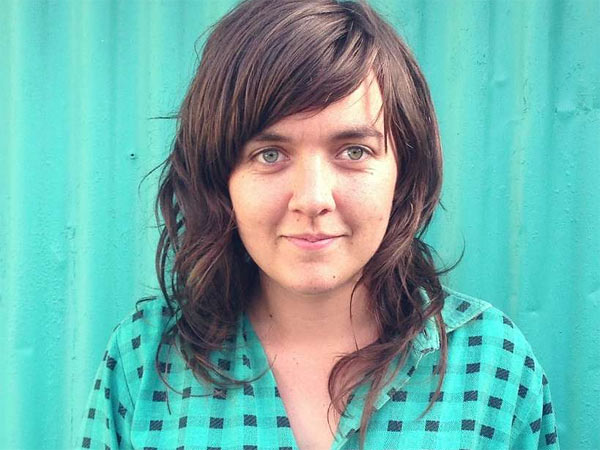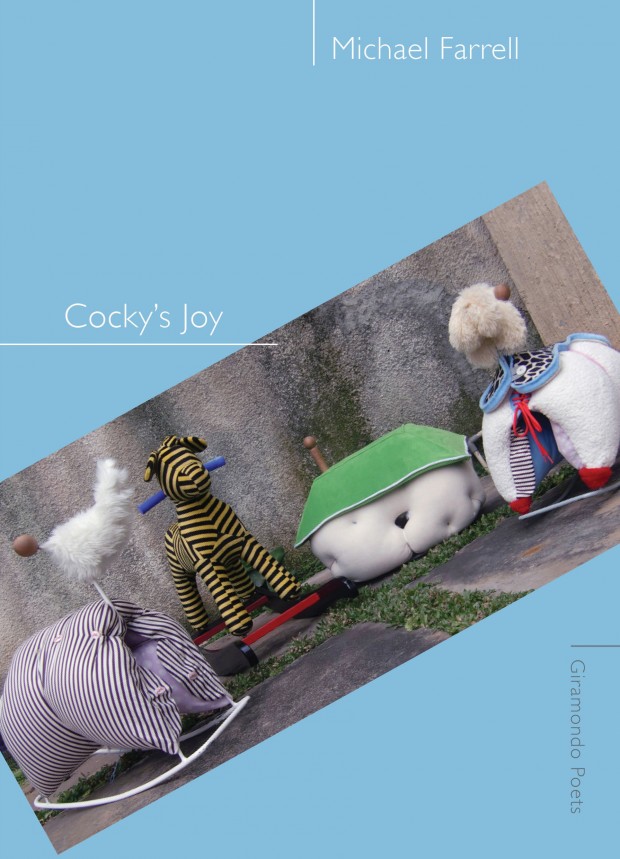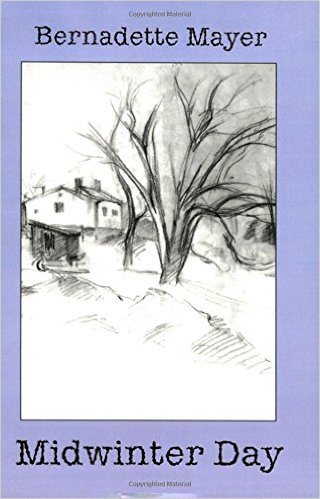10 outrageous things that happened in poetry in 2015. You won’t believe what number 6 is!
by Liam Ferney,
This is and isn’t a top ten poetry list for 2015. There are ten entries. They’re not all poets or books. Very few, if any, were actually published this year. But it is an opportunity to share the work that most shaped my thinking about poetry this year.
I said enough about Michael Robbins last week, but if I hadn’t The Second Sex would be on my list.
Next year I’ll be contemporary.
I promise.
deciBels (Vagabond Press)
Pam Brown’s brilliantly curated deciBels series, Vagabond Press’ Rare Objects replacement, proved a fertile well. Familiar faces in the ten pocket sized books included Toby Fitch whose Jerilderies worked its concrete/cut up magic on Ned Kelly’s famous letter while Susan M. Schultz’s latest memory cards, the Dogen Series, gathered together baseball, homelessness, Buddhism and the Hawaiian landscape. Ann Vickery’s long-awaited debut Pocketbook of Swoon, mined a familiar Australian-US poetic relationship in a metaphysical swoon producing poems that were both of, and beyond, a tradition. Brown turned me on to poets like Don Mee Choi whose scorching, and often very funny, Petite Manifesto was anything but in its harangue of capitalism, gender and colonialism and Maged Zaher whose Love Breathes Hard was an on point examination of the intersection of love and technology.

Courtney Barnett
This year Australia added another voice to our remarkably accomplished tradition of popular songwriters. Feted, not just on these shores, but coast-to-coast by the US critical cognoscenti, Courtney Barnett’s international success is surprising given how earthily Australian her lyrics are. Her deadpan drawl could only emerge from this sunburnt country. At times she sounds like she’s about to fall asleep at the mic, at others she is aflame with punk rock’s desperation. Her lyrics are frequently hilarious. Consider the account of an asthma attack in “Avant Gardener” from her first release, The Double EP: A Sea of Spilt Peas: “The paramedic thinks I’m clever cos I play guitar/ I think she’s clever cos she stops people dying.” And:
I take a hit from an asthma puffer
I do it wrong
I was never good at smoking bongs.
I’m not that good at breathing in.
But if I had to pick one lyric, in a year when our first Federal Treasurer bloviated, albeit briefly, about housing affordability, I’d opt for “Depreston” from her debut full length LP Sometimes I Sit and Think, Sometimes I Just Sit. A paean to an issue pertinent to almost all of Oz’s Gen Y’s: moving further out to afford your first home. While our economy flounders like a drunk on a dancefloor doused in detergent, Barnett nailed the absurdity of it all her with her real estate agent’s refrain: “If you’ve got a spare half a million/ You can knock it down and start rebuilding.”
“The Poet Tasters” Sydney Review of Books – Ben Etherington
Australia’s poetic ecosystem is a curious place and this year we got an outsider’s view of how truly strange it is. Ben Etherington, in a piece for Critic Watch in the Sydney Review of Books, used a largely quantitative approach to forensically dissect Australia’s poetry reviewing culture producing a top down look at the health of our poetry and its strengths, weaknesses and oddities that is more honest, more revealing and more nuanced than a dozen anthology introductions.

Cocky’s Joy – Michael Farrell (Giramondo Publishing)
Michael Farrell’s Cocky’s Joy was a somewhat improbable turning point in the career of one of Australia’s leading innovators. It manages to be his most accessible and funniest book without abandoning the rambunctious inventiveness that is Farrell’s hallmark. The poems interact with Australia’s bush poetry tradition in a way I’ve never seen before. In this spirit we get “Bush Christie”, a sort of Miss Marple of the Murrumbidgee featuring Mary Gilmore, Banjo Patterson, Adam Lyndsey Gordon, the Kelly Brothers and Bennelong. Not convinced? Read this by Ed Wright. It says everything I would but better.
hows its – Nick Whittock (Inken Publisch)
hows its’ publishing guff describes it as an appeal. Is it poetry Nick Whittock asks the umpire ass it jags in from outside off? Yes, but… This is poetry with all the oddness of Frog in a Blender’s left-arm chinamen. It is poetry that expands our understanding of poetry, crafting itself over abstract wagon wheels, ball-by-ball CricInfo commentary, score sheets and, awesomely (there is no other word for it) for a cricket fan of my vintage, a series of sketches riffing on the covers of Tangles Walker’s cricketing picaresques. This is how you puzzle a python. In a country where Test Captain is the highest unelected office anyone can aspire to, hows its is an aesthetic revelation creating its own avant-garde of willow wielders and leather flingers.
Only More So – Tony Lopez (UNO Press)
I didn’t actually read much of Tony Lopez’s Only More So this year but I’m always surprised more people haven’t heard of it so I figured it was worth adding to this list. A masterpiece of constructivism consisting of one long poem, in chapters, running to over 200 pages with a 25 page bibliography, every single sentence is lifted from somewhere else. Sources range from a history of Radio Four to a book on panic attacks to an article from The Guardian about a lawyer on extortion charges to Gertrude Stein. It is endlessly surprising. Every paragraph is a meditation on how appropriation, fragmentation and recontextualisation reshapes and reconstitutes meaning. Like Catch-22 it riffs on one joke but never outstays its welcome: “No study has yet tested whether trust varies by subjects’ knowledge or familiarity with the target. The expansion is suggestive of an infectious disease. The repeat may well be deliberate. There were three long frame-bases of decreasing sizes. Everyone had left the garden in the middle of a working day, intending to come back” (104). I still haven’t finished it and I’m not sure I ever want to. If you only check out one book on this list, make it this one.
Robert Adamson
I’ve kept more or less up-to-date with Robert Adamson’s recent books over the last decade or so but the early stuff has long been a blind spot. This year I pulled my copy of Mulberry Leaves from my shelf and left it by my bed, reading a poem or two on my back steps every couple of days. There is a rich mysticism in Adamson’s landscape poems. A kind of early morning fog settling in a river bend that makes you read slowly, compels you to put the book down and reflect. I read poems like “Goshawk over Broken Bay” again and again:
The hawk tumbles for its balance in a pocket of air.
I hold the bird book tightly in my hands.
My whole life seems curbed by these demands
For order – I fling back the chair,
Stride straight through the back door to the high
Verandah and stare directly at the hawk.
There is no order: just excuses for more talk.
I turn, instead of jumping from the rail I sigh –

Hamilton
Lin Manuel-Miranda’s musical has been a phenomenon and it is safe to say Broadway has never seen anything like it. The natural precedents would be verse dramas or Alan Wearne’s epics. Much has been said about the musical but I’d just like to add how perfectly the braggadocio and loquaciousness of hip hop fits the story of a revolution driven by a cadre of extremely smart, young people for whom words were as important as battlefield tactics.
It’s real success is how well the form suits the content. The early posse rap, featuring the young revolutionaries on the piss in a New York tavern, is a triumph of that mode, while both cabinet battles between Alexander Hamilton and Thomas Jefferson, the first over the foundation of a national bank and the second on support for Revolutionary-era France, have to be heard to be believed. It is the perfect form for Jefferson’s arrogance:
Life, liberty and the pursuit of happiness
We fought for these ideals
We shouldn’t settle for anything less
These are wise words, enterprising men quote them.
With Hamilton’s rebuttal is crushing:
A civics lesson from a slaver, hey neighbour
Your debts are paid because you don’t pay for labour
We plant seeds in the South we create – keep ranting
Because we know who is really doing the planting.
Genius is a word that gets tossed around too often but if anything deserves that label… But don’t take my word for it, the cast recording is on Spotify, do yourself a favour and enjoy a history lesson.
Drones and Phantoms – Jennifer Maiden (Giramondo Publishing)
It took me a long time to warm to Jennifer Maiden’s work. I couldn’t hear the music in her blank verse. Her language frustrated me. I felt like I was reading newspapers. Then something clicked and I realised how wrong I’d been. Not only is there music in Maiden’s poetics but there is a chutzpah in the way she demands readers locate it.
Drones and Phantoms, for me, was as addictive as a Big W bestseller. I literally couldn’t put it down. I know poetry is supposed to be read slowly but, like the desperate kid who can’t resist a sneak peak under the Christmas tree, I couldn’t stop myself. I had to read it again to remind myself of what it was I was so excited by. It includes one of my favourite, if most unlikely, poems of the year “Digging for Hoffa” about the search for the body of the infamous US unionist, and one of the strangest “Diary Poem: Use of Frank O’Hara”, spun out of one of OzPo’s more unusual comment threads. From start to finish Drones and Phantoms is sharply critical, constructing a grammar to consider political and ethical questions.

Midwinter Day – Bernadette Mayer (New Directions)
My interest in the daily-ness of poetry stems from Frank O’Hara’s Lunch Poems but working in politics, and struggling to find time to write, sharpened my interest. First I discovered Laynie Browne’s Daily Sonnets, which lead me to Bernadette Mayer’s A Midwinter Day. I haven’t finished Mayer’s book yet, but I spent a substantial amount of time thinking about it this year. Alice Notley calls it an “epic poem about a daily routine.” Taking place on a single December day its subject is motherhood and domesticity. Its depiction of daily routine drags the hidden nature of domestic ‘work’ into the spotlight becoming, in the process, a political gesture. As a man without children, it is a lens into a part of the world I simply can’t understand. As a writer with time pressures, albeit much easier to manage than Mayer’s, it provides a poetics of the everyday from which to draw from.
Some honourable mentions for the year include Fiona Hile’s Novelties (this would have been on my list last year), Robert Lowell’s Life Studies, Anna Akhmatova’s “Requiem”, Frank O’Hara’s “In Memory of My Feelings” (which Hile and Vickery reinvigorated for me), John Tranter’s Dazed in the Ladies Lounge, Jason Isbell’s album Something More than Free and Sun Kil Moon’s Benji, Hart Crane’s The Bridge, Ali Cobby Eckerman’s little bit long time, Paul Thomas Anderson’s film Inherent Vice, the Ai Wei Wei show at The Royal Academy in the UK and Bob MacPherson at GOMA. Towards the end of the year I really started to see things in Corey Wakeling’s Goad Omen I’ve seen before. In addition to being a master prose stylist Ta-Nehisi Coates’s Between the World In Me is a Molotov cocktail of ideas rethinking institutionalised racism.
Before I finish my month, I’d like to give a big shout out to Southerly for inviting me to blog. It’s been fun, challenging, rewarding and I’ve learnt a lot. Special thanks to Tessa for all her support. Much love to my fiancée Sarah for her patience, support and wise words. She is my ne plus ultra editor. Without you m’love these posts would be considerably diminished.